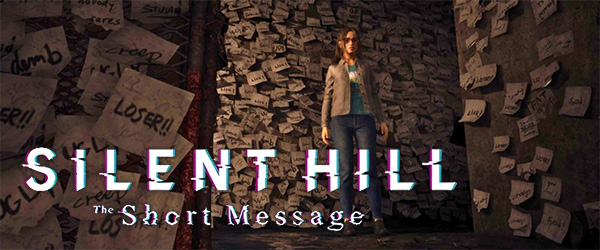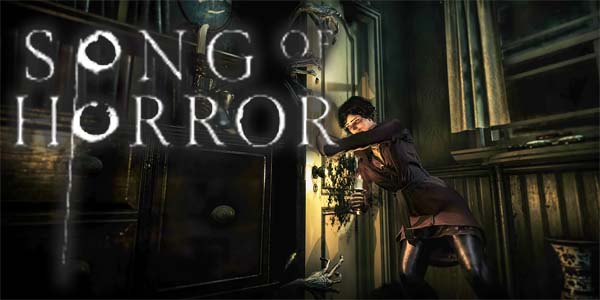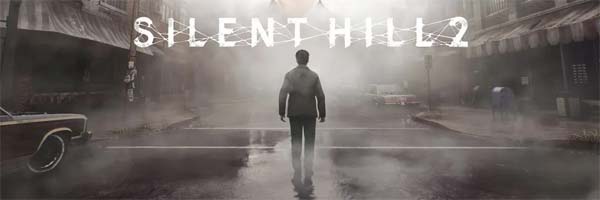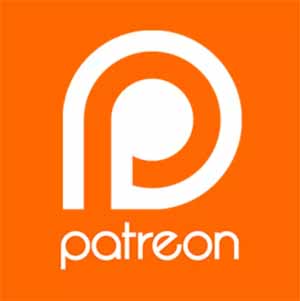
Silent Hill: The Short Message is a first-person horror game about wandering through looping, decrepit hallways in an abandoned apartment building, while confronting a secret, repressed guilt. And stop me if you've heard any of this before.
Silent Hill used to be a series that innovated, that pushed the envelope. The first game basically introduced the video-game-playing public to the concept of psychological horror. The second polished the formula to introspective perfection, while also providing a template for a plot twist that would be repeated in (what feels like) every horror game since -- at least the ones not named Resident Evil. Even action-oriented games like Dead Space ripped off Silent Hill 2.
Silent Hill 3 introduced gamers to a teenage girl protagonist who actually felt like a real person, instead of being a hyper-sexualized "boob ninja" in a bikini or skin-tight catsuit, while also providing jaw-dropping technical accomplishments. The moving, bleeding, living environmental textures of Silent Hill 3's Otherworld amazing and un-precedented at the time. And it's character models and lighting looked better than many games that would be released on the following generation of consoles.
Hideo Kojima's playable teaser P.T. spawned a cohort of horror games ripping off the formula of first-person looping hallway horrors, of which The Short Message is only the latest example. And heck, even P.T. was really only popularizing horror conventions that Silent Hill 4 had already started experimenting with a decade earlier.
This is a blunt and earnest depiction of teen depression, self-harm, and suicide.
The Short Message, on the other hand, is largely a retreading of horror gaming tropes that are quickly becoming tired and stale. The looping hallways were mind-blowing back when P.T. did it -- ten years ago. But I've seen it in seemingly every horror game since, from Layers of Fear to Visage to MadIson.
It isn't just general horror trends that The Short Message is retreading either. It's also invoking well-worn and frustrating habits that the Silent Hill series just refused to break in its never-ending quest to recreate the lightning-in-a-bottle that was Silent Hill 2. The character's repressed guilt being hidden from the player and revealed as a mid or late-game plot twist? Check. The person you're looking for being dead already? Check. Silent Hill acting as a purgatory that seems to be willfully trapping people until they confront and overcome aforementioned guilt? Check.
The heaviest, bluntest hammer Konami could find
One thing that The Short Message doesn't bother to copy from its ancestors is the subtlety and nuance that Silent Hill used to be famous for. The Short Message is unbelievably heavy-handed, blunt, and melo-dramatic. This is owing, in large part, to trepidation from Konami and/or developer HexaDrive about how to depict the game's subject matter: teen depression, self-harm, and suicide. It's a touchy subject, for sure. One has to give credit to Konami and HexaDrive for so directly addressing an issue that most game publishers and developers won't touch with a 20-foot pole.
HexaDrive's depiction of mental illness is not
as hopeless and fatalistic as Bloober's.
But this is also where The Short Message lands on one of its greatest strengths. It's blunt depiction of teen suicide is at least a hopeful and optimistic one -- one that is also grounded based on the very real social and technological issues that often motivate or catalyze real-life self-harm and suicide by actual teenagers. And this is not something that we should overlook in discussion of The Short Message. It's almost the polar opposite of how Team Bloober (the company that is developing the Silent Hill 2 remake) has historically treated the same topic. Bloober has always shown abuse victims as totally, fundamentally broken individuals for whom death or suicide is a welcome release that spares the world from their burden.
In contrast to Bloober, The Short Message wants depressed teens to know that they are not broken, that they can get help, and that there are people out there who care about them and would miss them and would be there for them in their times of need. The Short Message wants people to know that recognizing the red flags, and talking to the person can save their life, and that, for the depressed individual, things will get better.
If nothing else, The Short Message has its heart in the right place.
And let's face it, teenagers aren't exactly known for subtlety or nuance. Teenagers do tend to blow things out of proportion and be melo-dramatic. So it's hard for me to hold The Short Message's overly-blunt and melo-dramatic dialogue against it. Yeah it's cringe-worthy at times, but it's cringey in exactly the way that real-life teenagers are often cringey. There might also be more intentionality behind the blunt, cringey dialogue than is apparent at the surface level. Does the heavy-handed and cringey dialogue represent the literal events as they actually happened? Or are we seeing the world as the teenage character sees it? [More]
07ee844a-4982-4339-8a3d-c2ea2b7ed59f|2|5.0
Tags:Silent Hill, Silent Hill: The Short Message, Konami, HexaDrive, Masahiro Ito, Akira Yamaoka, teenager, suicide, bullying, social media, abuse, neglect, COVID-19, Kettenstadt, Germany, Silent Hill Phenomenon

Not only is it really great to play an indie horror game that captures the slow and thoughtful nature of old-school survival horror, but it's also refreshing to play a good old fashioned gothic horror game. So many indie horror games come off as feeling a bit pretentious with their reliance on suppressed guilt twists for their psychological horror plots. Song Of Horror bucks that trend by being a straight-forward horror story about haunted houses, possessed artifacts, and otherworldly mysteries.
Song Of Horror also ups the stakes by featuring a cast of multiple playable characters, each of whom can be killed off (and removed from the rest of the story) if the player screws up. So not only do we literally not know what eldritch abomination may lie around any given dimly-lit corner, or behind any creaky old door, but if you're not careful, whatever is around that corner or behind that door might put a premature end to a given character's life and story.
Strut and fret your hour upon the stage, and then ...
Song Of Horror was originally sold as an episodic indie horror game on Steam, but the collection of all episodes was released for console as a single game in 2021. It somehow slipped under my radar until last month, when YouTube recommended a video about it by Mert Kay Kay. Each episode includes 3 or 4 playable characters to choose from, each of whom can be permanently killed off if you fail to avoid or escape from the phantasms that haunt each episode. If a character dies, all the items and notes that they've collected will be dropped on the floor at the spot of their death, and that location will be marked on the next character's map. So you don't really lose any progress if a single character dies. If you lose all the characters in a given episode, however, then it's "Game Over"!
Each episode will introduce one or more new characters, but old characters can also re-appear as playable characters if they survived the previous episode(s). Thus, losing a character in an early episode may have the longer-term consequence of reducing the player's available lives (to borrow a term from old arcade parlance) for future episodes, and reducing your margin of error.
Each episode has 3 or 4 playable characters, each of whom can permanently die.
But even if you do manage to screw up and get all 4 characters killed in any given chapter, you only have to restart that chapter. Song Of Horror won't delete your save file and force you to redo the entire game. Each chapter takes 2 -- maybe 3 -- hours to complete on a first-playthrough, and can be done in well under an hour if you know what you're doing. It's actually a loss of progress that is somewhat on par with dying in an old Resident Evil game after doing a fair chunk of exploration without backtracking to a save point.
The legitimate threat of permanently losing a character will naturally raise the stakes of the game and of the horror. It will force the player to play cautiously, to be observant of your surrounding and of context clues in the environment, to pay close attention to sounds and shadows, and to not barge through every door in a rush. In fact, it may do this more effectively than even a game like Resident Evil. Dying doesn't mean simply restarting with the same character and retrying the set piece that got you killed. Dying means permanently losing that character, and having to try again with a new character. Restarting at a checkpoint doesn't simply reset the stakes, it doubles-down on them!
Furthermore, the actual jump scares and dangers are semi-randomized. You won't necessarily encounter the same jump scare or the same monster at the same place and time in any 2 playthroughs. This also keeps things tense, because even on a replay (whether it be a whole new playthrough, or just a respawn with a different character), you can't just memorize all the places to avoid.
[More]
0ffa3716-e34f-4cd6-a026-763157eedc54|0|.0
Tags:Song of Horror, Protocol Games, Raiser Games, horror, cosmic horror, gothic horror, H.P. Lovecraft, perma-death, music, sound, light, dark, Silent Hill

By the time you read this, the remake of Silent Hill 2, being developed by Bloober, is less than 2 months from its expected release. So nothing I write here can possibly change the game. But there has been something that has been nagging at the back of my brain ever since the first trailer for the remake released. Since most of the concern about Bloober's Silent Hill 2 is focused on their historically awful depictions of mental health and trauma, I haven't seen a whole lot of content addressed at this particular concern of mine. So I thought I'd share my thoughts.
First and foremost, I will be discussing the story and ending of the original Silent Hill 2, as well as speculation regarding whether Bloober will change this ending, or somehow botch its execution. As far as I'm concerned, the announcement trailer has already shown that it will be one or the other: a changed ending, or a botched ending. But in any case, if you haven't played Silent Hill 2 before and don't want to be spoiled, then don't read this post. You've been warned.
The announcement trailer for Silent Hill 2: Remake.
Before moving on, feel free to check out the announcement trailer in its entirety, above. You can also watch this complete analysis in video essay format on YouTube.
This entire analysis is also available in video essay format on YouTube.
The original opening
For anyone still here after the spoiler warning, let's talk a little bit about the opening scene of Silent Hill 2, how it relates to the game's ending(s), how this same scene is depicted in the remake trailer, and what the changes to that scene mean for the ending. Silent Hill 2 opens as such:
A mostly calm and collected James Sunderland stares at himself in a dirty bathroom mirror, taking a deep breath, and then walking out to a scenic overlook to explain the premise of the game. He got a letter from his wife, who died of a terminal illness 3 years ago. The letter says that she's alive and waiting for him in Silent Hill. He knows it can't possibly be true, but if there's any chance that she is somehow still alive, he has to know.
This opening shows us a James who is supposedly 3 years removed from the death of his wife. He isn't necessarily grieving any more, but doesn't seem to have completely moved on; otherwise, why be here? Regardless, he is completely surprised by this letter and in disbelief. This is a subtle, subdued opening that gives the player little reason not to take this all at face value. And it goes on to follow this up with a slow-burn opening act to the game, in which James strolls casually through a wooded path along the lake and doesn't encounter anything overtly scary or threatening for a good 20 or 30 minutes, depending on the pace that the player is going.
The original is subdued and gives little reason to not take the premise at face value.
This puts the player in the same headspace as James. We are just as confused, surprised, and curious as him, but with that nagging certainty that all must not be as it seems. This allows the player to role play as James in good faith and sets up the game's eventual twist, and also sets a relatively clean slate for the various ending triggers. The player doesn't see James as anything other than a confused husband, desperately hoping to see his possibly-not-dead wife again. The player is able to play James as such, and how you role play as James will inform how he eventually deals with the game's twist revelation. But the game will be slowly pulling the rug out from under James and the player over the course of the game, gradually establishing him as an un-reliable narrator.
Considering the additional context that this is a sequel to Silent Hill (which was about a father trying to rescue his daughter from a demonic cult), players may have had even less reason to not trust James. They have no clue that this game is going to deviate from the first game's premise and be an introspective and metaphorical tale that is almost completely divorced from the first game's plot. They just know it has the number 2 in the title, so it probably follows from the story of its predecessor. Maybe Mary really is alive? Maybe she's another vessel for the cult's demon god? Or maybe her soul was also split and there's a psychic Mary doppelganger living in Silent Hill who is summoning James to help her stop the cult's plans? Or maybe that doppelganger wants to trick him into helping the cult? And hey, guess what? A few hours into the game, we do indeed meet a Mary doppelganger!
Based on the opening minutes of the game, Silent Hill 2 can go in a lot of potential different directions, either introspective, supernatural, cult-driven, or any combination thereof.
[More]
At the top of my list of favorite game franchises, sits 2 seemingly unlikely companions: one is the first 4 Silent Hill games developed by Konami's internal "Team Silent" studio; the other is the series of "Souls-Borne" games created by From Software. If these 2 franchises are not my number 1 and number 2, respectively, then they are both definitely in my top 3, with Sid Meier's Civilization being the only other real contender.
On the surface, Silent Hill and the Souls-Borne games don't seem to have a lot in common, nor would one necessarily think that they would appeal to overlapping audiences. In some senses, it would seem that they couldn't be further apart. Silent Hill is a series of slow-paced psychological horror games with linear narratives, that emphasize puzzles and encourage the player to run away from threats and avoid the games' poorly-developed combat mechanics. The Souls-Borne games are frenetic action-RPGs that barely have any plot at all, and which are built entirely around combat mechanics, and which are infamous for their difficult gameplay. But despite the radically divergent styles of gameplay that these 2 franchise offer, they both contain similar themes and are open to similar artistic interpretations, which appeal to me, personally because of a particular aspect of my core beliefs and identity.
You see, I'm an atheist. More specifically, I consider myself to be a "strong atheist", "anti-theist", and "secular humanist", among other labels. Not only do I not accept any of the various god-claims due to insufficient evidence; I also positively believe and assert, with confidence, that there are no gods at all. Now, I'm sure that I've just invited a slew of commenters who will try to convert me or share their beliefs for why their personal god is real, but I'm not here to argue about the theology. Besides, I've pretty much heard it all. Not just on the internet, but also from extended family. God of the gaps, personal incredulity, watch-maker, Pascal's Wager, Kalam and other various Cosmological Arguments. I've heard it all -- or at least most of it. And I reject it all.
I am as confident in my belief that there is no god, as I am in my belief that there is no Santa Clause (and for many of the same reasons). So unless you think you can convince me that Santa Clause is real, you're probably wasting your time trying to convince me about your god.
View this entire essay in video format on YouTube.
But my atheism goes a bit further. I'm also an anti-theist, and I believe that religion and religious institutions are also dangerous and do more harm to society than good.
And based on my own personal reading of both Silent Hill and the Souls-Bornes, it seems that both game franchises kind of agree with me. [More]
e41c0e7e-50b9-4d3d-ad3d-eedbb712815d|10|2.1
Tags:atheism, religion, god, faith, Silent Hill, From Software, Demon's Souls, Dark Souls, Bloodborne, Elden Ring, Star Trek, original sin, Christianity, Judaism, curse, Way of White, Healing Church, blood ministration, orphanage, cult, abortion
For Halloween this year, and in anticipation of Konami announcing new Silent Hill titles, I have adapted an old blog post about the Lakeview Hotel of Silent Hill 2 into a YouTube video essay. The video essay includes some revisions, including clarifications of certain points, further explanation of some of the assumptions and head canon that go into my interpretations, and so forth.
This video essay was available exclusively to Patreons for 2 weeks prior to public release.
This video was available exclusively to Patrons for 2 weeks prior to its public release. If you would like to support my content creation, and get perks such as early access to content, please check out my Patreon page and consider becoming a contributor. And be sure to take the Patron entry survey to tell me which content you like the most, so that I can try to produce more of that type of content.

Editing of the video and its release to Patrons was completed a couple days before Konami announced its upcoming livestream in which it would announce new games, so I sadly did not know about the new slate of Silent Hill games (including the official announcement and trailer of the Silent Hill 2 remake). At the time of releasing this video, all of that was still rumor -- and not entirely convincing rumor, considering the bevy of Silent Hill rumors that have been floating around since the cancellation of Hideo Kojima's Silent Hills all the way back in 2015. [More]
|

| 12 | | | | | | | 60 | | 11 | | | | | | | 55 | | 10 | | | | | | | 50 | | 09 | | | | | | | 45 | | 08 | | | | | | | 40 | | 07 | | | | | | | 35 | | 06 | | | | | | | 30 | | 05 | | | | | | | 25 | | 04 | | | | | | | 20 | | 03 | | | | | | | 15 | | 02 | | | | | | | 10 | | 01 | | | | | | | 05 |
|